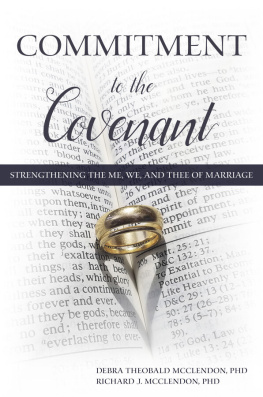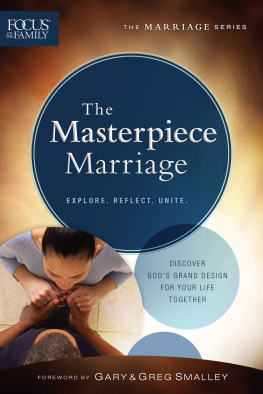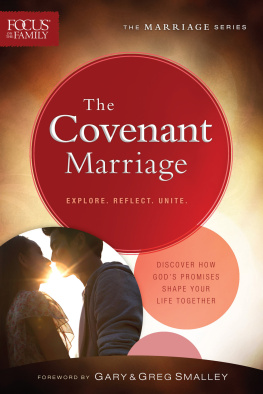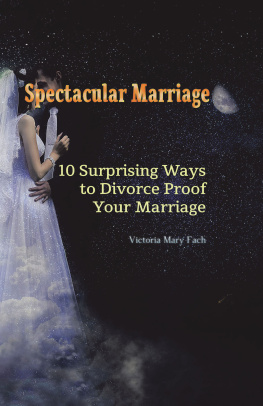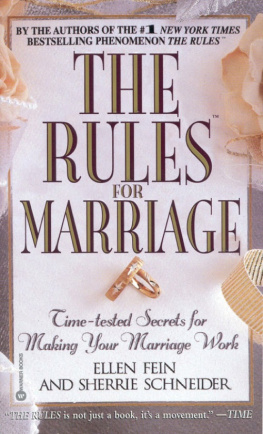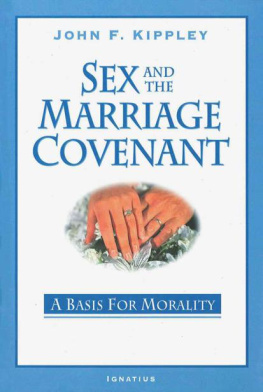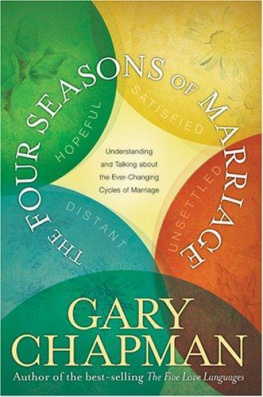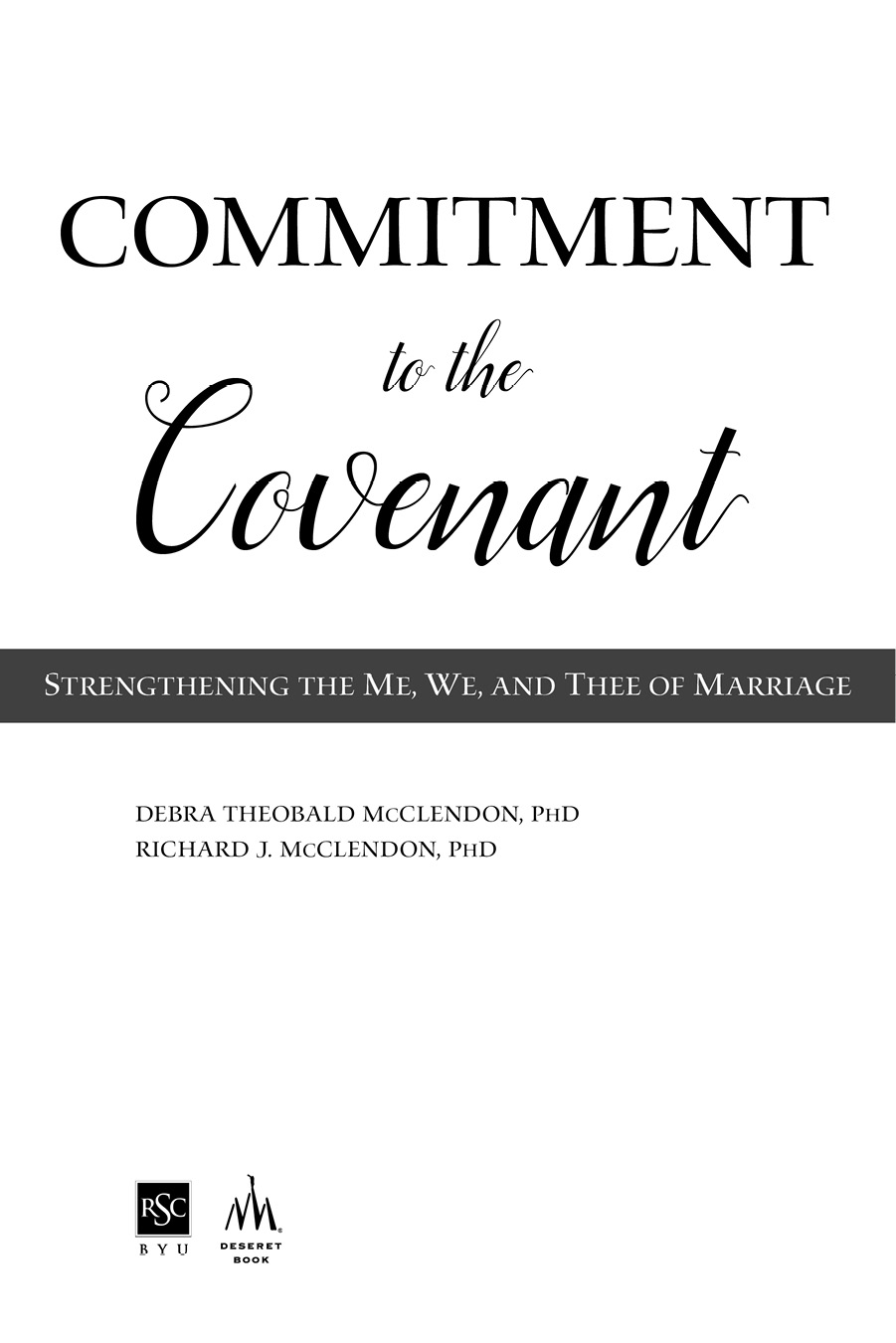Published by the Religious Studies Center, Brigham Young University, Provo, Utah, in cooperation with Deseret Book Company, Salt Lake City. Visit us at rsc.byu.edu.
2018 by Brigham Young University. All rights reserved.
Printed in the United States of America by Sheridan Books, Inc.
DESERET BOOK is a registered trademark of Deseret Book Company.
Visit us at DeseretBook.com.
Any uses of this material beyond those allowed by the exemptions in US copyright law, such as section 107, Fair Use, and section 108, Library Copying, require the written permission of the publisher, Religious Studies Center, 185 HGB, Brigham Young University, Provo, Utah 84602. The views expressed herein are the responsibility of the authors and do not necessarily represent the position of Brigham Young University or the Religious Studies Center.
ISBN 978-9443-9431-8
Library of Congress Cataloging-in-Publication Data
Names: McClendon, Debra Theobald, 1975- author. | McClendon, Richard J. (Richard Jennings), 1962- author.
Title: Commitment to the covenant : strengthening the me, we, and thee of marriage / Debra Theobald McClendon, PhD & Richard J. McClendon, PhD.
Description: Utah : Religious Studies Center, Brigham Young University, [2018] | Includes bibliographical references.
Identifiers: LCCN 2017049434 | ISBN 9781944394318
Subjects: LCSH: Marriage--Religious aspects--Church of Jesus Christ of Latter-day Saints. | Marriage--Religious aspects--Mormon Church.
Classification: LCC BX8643.M36 M33 2018 | DDC 248.8/44--dc23 LC record available at https://lccn.loc.gov/2017049434
For
Our Children
Preface
Commitment to the Covenant: Strengthening the Me, We, and Thee of Marriage is a work of scholarly nonfiction strengthening marriage from three broad content areasthe things we need to do personally to improve our marriage (Me), the things we need to do together as a couple to strengthen our marital relationship (We), and the things we need to do personally and together as a couple to invite God into our marriage (Thee). While other publications focus either on religion or a particular academic discipline separately, we combine social science research with scripture, doctrine, and the counsel of latter-day prophets and apostles. We do this by drawing upon Richards sociological training and his work in the Church Educational System, as well as Debras training in marriage and family therapy and clinical psychology and her experiences as a psychotherapist. We believe that this multifaceted approach provides a rich perspective that can help a wide audience of LDS couples along their own marital journeys.
This book is a reflection of our professional and personal testimonies of the truthfulness of these principles. Writing this book has blessed our marriage as we have strengthened our own commitment to the covenant. We pray that you, too, may be blessed as you read from its pages.
We feel that Heavenly Father has been intimately involved in the process of writing and publishing this book. We are grateful for His guidance; He has continually prompted us as we have sought His direction. We would also like to express gratitude to all contributors who offered their personal stories to enrich this book. We are grateful to Bruce Chadwick for his many hours of editing. Finally, we appreciate the assistance of Brigham Young Universitys Religious Studies Center staff: Thomas A. Wayment, Joany O. Pinegar, R. Devan Jensen, Brent R. Nordgren, Tyler Balli, Carmen Durland Cole, Mandi Diaz, Emily Strong, and Shannon Taylor.
Debra Theobald McClendon and Richard J. McClendon
Chapter 1
Commitment to the Covenant
Debra : Richard and I are very different. The first couple of years of our marriage were difficult and painful. We had a lot of adjustments to make in order to be able to get along, become unified, and find happiness together. When I met Richard, I was a divorced, single mom with two very young daughters, most of the way through a clinical psychology PhD program. Working toward finishing my academic and professional training as a single mom was already difficult, but dating Richard, a longtime bachelor, upped the intensity of this period significantly.
As the relationship progressed, the thought of being married again created a lot of fear of rejection for me, yet I moved forward in faith because I loved and respected Richard and knew he loved God and took seriously his role in Gods plan. I sensed that Richard and I would be very good together, and I felt that God sanctioned the union. I also felt strongly that my daughters needed to be raised in a home with both a mother and a father who loved each other. Yet there were issues.
By the time we married, Richard had lived as a bachelor for twenty-four years postLDS mission. Needless to say, he had anxiety about getting married, wasnt very flexible, and knew how things should be done (and I wasnt doing them that way). As a result, he was sometimes critical of me. We had arguments during our early relationship as I tried to defend my own worth and value to him while struggling with very real personal insecurities. I feared rejection, and Richards actions intensified those fears through his unaccepting stance on a variety of personality issues. To be honest, I wasnt sure whether he was committed to me or to our marriage.
Richard : I was a bachelor until I was forty-five years old. I had accumulated years of formal education and work experience, looking forward to the day when I could be a husband and father. However, many years of bachelorhood had rooted me in a comfortably settled lifestyle. I had some uncertainties, inflexibility, and a lot of anxiety when it came time to finally tying the knot. I had some major adjustments to make being married to a real woman with her own personality with unique strengths and flaws, rather than being married to the imagined, perfect wife that I had spent so many years hoping for. I made a lot of mistakes with Debra, trying to make her what I thought she should be rather than accepting her for who she was. This created a lot of conflict in our early relationship. She was not always patient with me in these situations, but thankfully she was forgiving of my self-righteousness and kept working with me. (I have often joked that it finally took a psychologist to get me married, but perhaps there is some truth to that!)
Through the Lords help, and our determination to make our marriage work, we weathered through those difficult early years, holding on to a hope that we could find greater happiness together. We learned critical lessons that, as we implemented them, set our relationship on a more positive course. Years later our marriage is thriving and wonderful. There are times that we still have disagreements, but we have learned to avoid the type of painful arguments we had in the early years. This has come as a result of our commitment to the covenant, which has created a daily, purposeful commitment to each other and to our marital relationship. We work hard to love each other, and we enjoy those marvelous benefits.
Commitment to the Covenant
President Dallin H. Oaks observed that a good marriage does not require a perfect man or a perfect woman. It only requires a man and a woman committed to strive together toward perfection. This book is born from that prophetic counsel. Marriage is an eternal principle in the plan of salvation. Marriage is the institution God established to bring a man and a woman together in order to support and sustain each other while traveling the mortal road toward perfection. Marriage is the workshop or factory where imperfect people join their efforts and synergize their unique individual gifts to build unifying celestial characteristics and find joy. Spouses are often very different from each other. Sometimes this creates misunderstanding and frustration that leads to arguments, resentment, or discord. President Oaks reminds us that regardless of differences, a good marriage is one in which both spouses are highly committed to each other and highly committed to working to improve their marriage.

